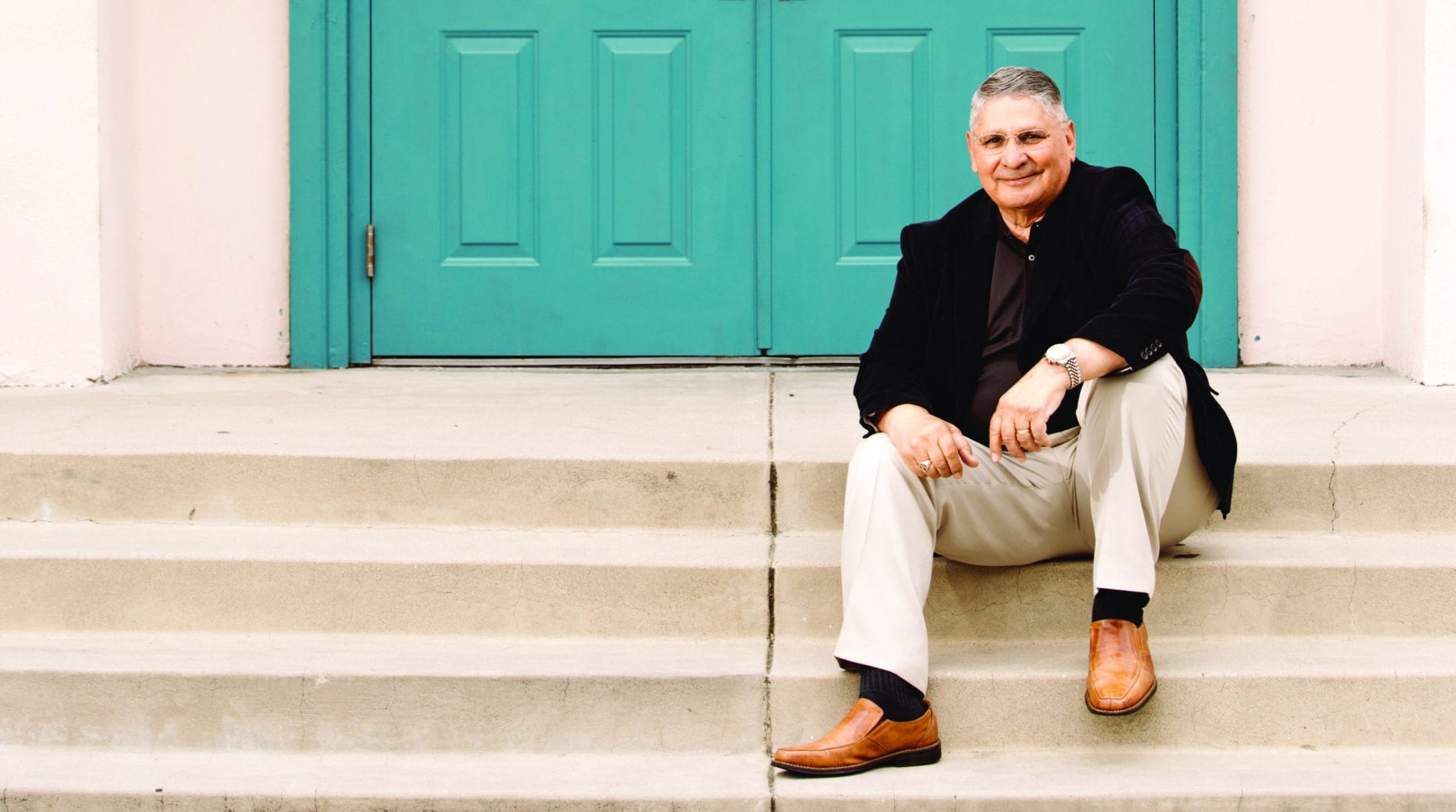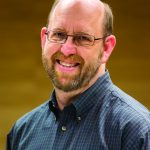How his own path to education prepared the retiring CHET president to lead a new generation of Latino and Latina students to serve the church
Growing up in a small town in Arizona, Ed Delgado sensed a strong call to ministry that fueled his desire to provide Bible education opportunities around the world. For the past 12 years, he has served as president of Centro Hispano de Estudios Teológicos (CHET), the Covenant’s ministry training center for Spanish-speaking clergy and laypeople. He first came to CHET as a board member in 1999, then served as the school’s dean and vice president from 2000 to 2005. Delgado retires in September.
One of CHET’s primary goals has been to provide underserved and under-resourced Latino and Latina students with opportunities for ministry education. During Delgado’s tenure, the school expanded its curriculum and developed new pathways for students into credentialed ministry and graduate schools. CHET, which started with 50 students in 1989, had 452 students from 17 countries enrolled last year. Ninety-five percent of Spanish-speaking Covenant pastors have taken at least some courses through CHET.
How did your experience as a first-generation college student
prepare you to serve CHET students?
My dad was born in the United States, and my mom was born in Mexico one day before she arrived in the United States. Both of my parents were very bright. My dad was one of nine kids, and he loved school. But his family called him lazy because he wouldn’t skip school to help them in the fields, so he left home. Eventually he was able to get his high-school diploma.
My mom won awards when she graduated from eighth grade. The first day of high school, she realized she didn’t have the money for books or paper, and she only owned one dress. So she dropped out and went to work cleaning people’s homes.
When my brother and two sisters were born, my parents’ desire for us to go to school was really deep, and they did everything possible to help us. They put us in preschool, which was unusual at the time. They constantly encouraged us to be good students, to respect our teachers.
I knew I wanted to go to college, but our high school didn’t have a counselor to help us prepare. I didn’t know you had to take an entrance exam like the SAT to get in. One day we were told that anybody who wanted to go to the university had to be at the high school early Saturday morning. When I got there they said, “Everybody who is taking the test needs to get on the bus.”
The bus took us to the high school in the next town where they led us into the gym. There were desks all lined up with number two pencils. They told us to sit down, but I didn’t quite understand what was going on. Someone said, “Okay, you’re going to take this exam. You can’t get up, and you have to ask permission to move. Use the number two pencil, and take the exam.”
I guess I did pretty well because I made it into the University of Arizona. I went there because I didn’t know I could apply anywhere else.
What is unique about the CHET student population?
Ninety percent of the students studying at CHET are the kind of person I was as a young boy. Many of them haven’t been able to complete high school. They know they have a call to ministry, and they want to be equipped, but they haven’t had anyone to help them take the next steps. That’s what drives me to guide them, provide them resources, show them care.
All our students are part-time, and almost all of them have jobs, so it’s a real sacrifice to be in school. Many of them come from extreme poverty or from countries torn apart by violence. A lot of them are the first ones in their families ever to get any advanced schooling, and some have never experienced graduation at any level. All of them really want to be here. They’re super committed. Our commencement ceremonies are filled with tears because they never expected this could happen.
The most fulfilling thing for me is to watch them as they grow. As they develop and become equipped, they start to fly. They’re becoming pastors in churches, leaders in nonprofit organizations, and ordained and credentialed in the Covenant Church. We’ve poured our lives into them and it’s exciting to see them succeed.
What was your vision when you arrived at CHET, and how have you seen that fulfilled?
Part of my DNA is that I always see the potential wherever I am. Before I came to CHET, I worked for Compassion International. In that work, I would see a church without a roof or without running water or much of anything else. It didn’t matter to me; I just saw potential for helping them develop a ministry. So I never thought of CHET as a young, small Bible institute. I always saw what it could be in 20, 30, 40, or 50 years. I still see it that way.
I am grateful I was able to make sure we had the appropriate administrative and governance structure as we grew, as well as the finances and staff to stay focused on our mission. One of the great things about our staff is that they’re not just employees, they’re men and women with a strong sense of call and a commitment to the students.
We were one of the first three Hispanic Bible institutes to receive certification for our bachelor of Christian ministry degree under standards approved by the Association of Theological Schools (ATS) and the Asociación para la Educación Teológica Hispana (AETH), which is the Hispanic educational theological association. Being certified meant our students could earn a baccalaureate degree for pastoral ministry at a cost within their means.
Five or six years ago, we wouldn’t have thought about distance learning or virtual classrooms. We knew we had resources that would benefit Covenanters in Latin America, but I never would have dreamed we would actually be serving them internationally and nationally the way we are now. Today we have 12 learning centers in six states throughout the United States. We’ve had an online student in Nicaragua and several in Mexico, as well as requests from other countries. We recognize that learning is contextual, so it doesn’t always work to adapt to other settings. But even if we can’t offer distance learning or a virtual classroom, we make the materials available.
How did you become part of the Covenant?
In 1981, Lynda and I were transferred to Colorado Springs by the business I was working for. When we arrived, they took us to a neighborhood with four or five homes that had just been built and said, “Which one do you want to live in until you have your own place?”
So, along with our son and daughter, who was one year old, we moved into one of those homes on a Friday. Our belongings were in storage back in Arizona, and all we had with us was our luggage. There was nothing in the house, not even curtains.
On Saturday, we got curtains. And Lynda and I said to each other, “We’ve always been committed to church, so let’s find a place to go to worship on Sunday.”
We looked around, and just down the hill from the house was Faith Evangelical Covenant Church. We didn’t know anything about it, but we decided to try it out. So on Sunday morning, we drove down the hill.
We went in, and we were the very first Latinos in that church, ever. They had a secretary who was Latina, but that was it. That morning we were really welcomed. People were happy to have us there, and it felt good.
On Monday morning the doorbell rang, and when I answered the door, it was Paul Erickson, the pastor. I thought, “Wow, we have a pastor calling on us! How unusual is that?”
When we invited him in, he looked around the house and said, “What happened here?”
We explained that we had just moved and the company was sending a truck with all of our stuff.
That same day, members of the church started bringing things over—a table, pots, pans, all kinds of things. Basically, the Covenant adopted us, and we, in turn, just loved the Covenant. That became the love affair that we still have to this day.
What are your plans for retirement?
Currently, I’m serving as president of the board of AETH. The only organization of its kind, it is committed to equipping Latino men and women, educating them, helping Bible institutes like ours develop leaders, and helping students who have made it into graduate school become professors and pastors. I plan to continue in that position because it provides me an opportunity to help advance my commitment to this dream.














